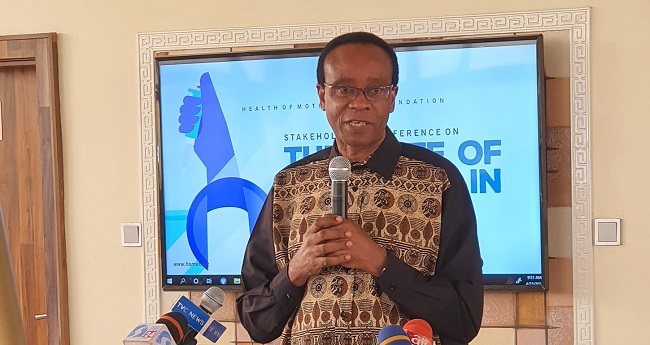Considering the Federal Government’s approval for the environmental release and open cultivation of genetically modified crops including “Tela” maize, Health of Mother Earth Foundation (HOMEF) held her final School of Ecology (SoE) which focused on issues around biosafety, biosecurity and related threats. The conference aimed to decolonise the narratives around food systems and the state of biosafety in Nigeria and Africa at large.

In this session, different challenges surrounding biosafety and ways through which the food system can be protected and preserved from harmful technologies and chemicals were x-rayed.
Speakers at the virtual School of Ecology included Joyce Brown, who spoke on Understanding Genetically Modified Organisms, Gene Drives and the threat to Biosafety and Biodiversity; and Professor Johnson Ekpere, who spoke on the gaps and opportunities in Biosafety Laws in the light of the African Model Law.
Other speakers included Nnimmo Bassey, Director, HOMEF, who spoke on the economic and environmental implications of Emerging Agricultural Technologies; and Dr Ifeanyi Casmir, who addressed The Nigerian Reality in the context of biosafety, biosecurity and food systems. The final presentation was by Mariann Orovwuje, who addressed the way forward for Biosafety and Food Sovereignty in Africa.
In his presentation, Bassey stressed that preservation of the biodiversity is critical for the productivity of small-scale farmers who are the ones feeding the world. He added that monocultures and colonial agricultural patterns promote species loss, soil degradation and dependence on chemical pesticides and herbicides.
He also spoke on the geo-engineering as a false solution to climate change, and as they lock in fossil fuels dependency and do not address the root causes of global warming. According to him, technologies are being promoted in a bid to present industrial agriculture as a climate solution rather than as the problem that it is.
These “emerging technologies are not about tractors or irrigation systems.”
They are about big data that would monitor soils for nutrients, water and other parameters and would promote the use of technologies that could eventually create farming without farmers. He talked in this light concerning Agricultural Innovation Mission 4Climate Change (AIM4C) which was launched at COP26 and is promoted by USA and United Arab Emirates and many other nations, philanthropies and data companies.
In his presentation, Prof Ekpere, a former Secretary General Scientific of the Technical and Research commission of Organisation of Africa Union (OAU/STRC), noted that African nations had seen the need to provide a broad legal framework within which nations would determine how best to frame their biosafety laws. He noted that this template has been largely eroded and “we have completely destroyed the traditional breeding system because of the entrance of GMOs.”
According to him, “there is really no difference in productivity between GMOs and traditional bred crops. The agency that oversees biosafety in Nigeria should be consistent with its work, and all decisions should be backed by local research rather than on results from other countries.
“We can’t take results from other countries and work with them in our own country. It will be too late if GM crops lead to illnesses in the future which we do not have cure for. Let us retrace our steps and begin to do what works for us.”
On her part, Joyce Brown said: “We must be careful how we interact with nature because we will bear the consequences. We must ensure and be sure of the kind of technology we want before adopting them. Let’s be careful how we use science before it becomes a big issue for us. Strengthening issues that threaten our policies should not be encouraged by our government. We need to invest more on research and close the knowledge gaps that exist in the public, government and scientific circles.
Dr Ifeanyi Casmir, an Associate Professor in the Department of Veterinary Medicine, University of Abuja, noted that Biosafety as a term speaks to actions and policies in place to protect nations from harmful practices.
He noted a lack of synergy between the biosafety regulators and other agencies such as NAFDAC and Ministry of Health who regulate food system and asserted that because of this “biosafety and food systems have become a concern regarding public health in Nigeria. What causes the concern and debate is the lack of appropriate coordination, people are now wary of what they eat. Biosafety agency
should be ready to take up issues which are working against the wellbeing of the people. Biosafety laws shouldn’t be merely to approve things whose risk assessments have not been transparently examined and which can work against humans.”
This session exposed participants to the fact that technology is good, and the best technologies are developed to meet the needs of the people. Technologies are not only about things which are developed in the laboratories as represented by GMOs, gene drives and synthetic biology.
The School of Ecology was rounded up with a demand that government should enforce the precautionary principle which is the bedrock of biosafety regulation. A call was also made for a moratorium on the release of GMOs and adoption of other emerging technologies that poses threats to our environment and food systems.
There should be more public investment in research to ensure independence and unbiased assessments to confirm the safety of the technologies. Small holder farmer/ local systems should be supported and strengthened as they are the backbone to food security.
To address the climate and food crises we must address their root causes; and as a way forward, take on solutions which work with nature instead of against it and promote systems that support the livelihoods of millions of people depending on them. Agroecology was recommended as a viable solution to both the climate and food crises.
